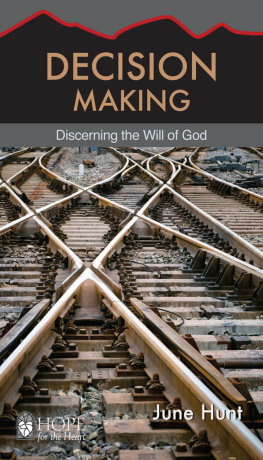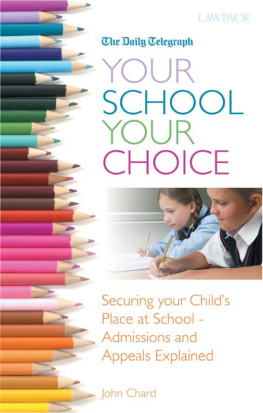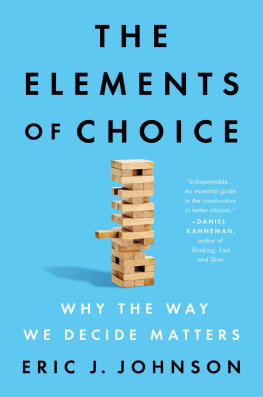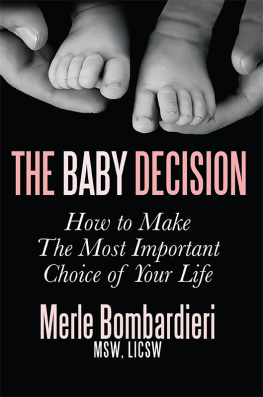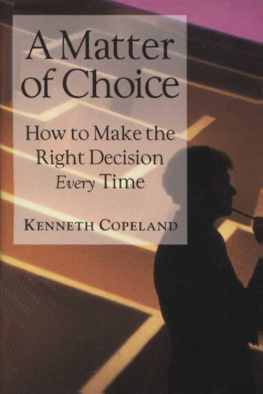A BOUT SIX YEARS AGO, I WENT TO THE GAP TO BUY A PAIR OF JEANS. I tend to wear my jeans until theyre falling apart, so it had been quite a while since my last purchase. A nice young salesperson walked up to me and asked if she could help.
I want a pair of jeans3228, I said.
Do you want them slim fit, easy fit, relaxed fit, baggy, or extra baggy? she replied. Do you want them stonewashed, acid-washed, or distressed? Do you want them button-fly or zipper-fly? Do you want them faded or regular?
I was stunned. A moment or two later I sputtered out something like, I just want regular jeans. You know, the kind that used to be the only kind. It turned out she didnt know, but after consulting one of her older colleagues, she was able to figure out what regular jeans used to be, and she pointed me in the right direction.
The trouble was that with all these options available to me now, I was no longer sure that regular jeans were what I wanted. Perhaps the easy fit or the relaxed fit would be more comfortable. Having already demonstrated how out of touch I was with modern fashion, I persisted. I went back to her and asked what difference there was between regular jeans, relaxed fit, and easy fit. She referred me to a diagram that showed how the different cuts varied. It didnt help narrow the choice, so I decided to try them all. With a pair of jeans of each type under my arm, I entered the dressing room. I tried on all the pants and scrutinized myself in a mirror. I asked once again for further clarification. Whereas very little was riding on my decision, I was now convinced that one of these options had to be right for me, and I was determined to figure it out. But I couldnt. Finally, I chose the easy fit, because relaxed fit implied that I was getting soft in the middle and needed to cover it up.
The jeans I chose turned out just fine, but it occurred to me that day that buying a pair of pants should not be a daylong project. By creating all these options, the store undoubtedly had done a favor for customers with varied tastes and body types. However, by vastly expanding the range of choices, they had also created a new problem that needed to be solved. Before these options were available, a buyer like myself had to settle for an imperfect fit, but at least purchasing jeans was a five-minute affair. Now it was a complex decision in which I was forced to invest time, energy, and no small amount of self-doubt, anxiety, and dread.
Buying jeans is a trivial matter, but it suggests a much larger theme we will pursue throughout this book, which is this: When people have no choice, life is almost unbearable. As the number of available choices increases, as it has in our consumer culture, the autonomy, control, and liberation this variety brings are powerful and positive. But as the number of choices keeps growing, negative aspects of having a multitude of options begin to appear. As the number of choices grows further, the negatives escalate until we become overloaded. At this point, choice no longer liberates, but debilitates. It might even be said to tyrannize.
Tyrannize?
Thats a dramatic claim, especially following an example about buying jeans. But our subject is by no means limited to how we go about selecting consumer goods.
This book is about the choices Americans face in almost all areas of life: education, career, friendship, sex, romance, parenting, religious observance. There is no denying that choice improves the quality of our lives. It enables us to control our destinies and to come close to getting exactly what we want out of any situation. Choice is essential to autonomy, which is absolutely fundamental to well-being. Healthy people want and need to direct their own lives.
On the other hand, the fact that some choice is good doesnt necessarily mean that more choice is better. As I will demonstrate, there is a cost to having an overload of choice. As a culture, we are enamored of freedom, self-determination, and variety, and we are reluctant to give up any of our options. But clinging tenaciously to all the choices available to us contributes to bad decisions, to anxiety, stress, and dissatisfactioneven to clinical depression.
Many years ago, the distinguished political philosopher Isaiah Berlin made an important distinction between negative liberty and positive liberty. Negative liberty is freedom fromfreedom from constraint, freedom from being told what to do by others. Positive liberty is freedom tothe availability of opportunities to be the author of your life and to make it meaningful and significant. Often, these two kinds of liberty will go together. If the constraints people want freedom from are rigid enough, they wont be able to attain freedom to. But these two types of liberty need not always go together.
Nobel Prizewinning economist and philosopher Amartya Sen has also examined the nature and importance of freedom and autonomy and the conditions that promote it. In his book Development as Freedom he distinguishes the importance of choice, in and of itself, from the functional role it plays in our lives. He suggests that instead of being fetishistic about freedom of choice, we should ask ourselves whether it nourishes us or deprives us, whether it makes us mobile or hems us in, whether it enhances self-respect or diminishes it, and whether it enables us to participate in our communities or prevents us from doing so. Freedom is essential to self-respect, public participation, mobility, and nourishment, but not all choice enhances freedom. In particular, increased choice among goods and services may contribute little or nothing to the kind of freedom that counts. Indeed, it may impair freedom by taking time and energy wed be better off devoting to other matters.
I believe that many modern Americans are feeling less and less satisfied even as their freedom of choice expands. This book is intended to explain why this is so and suggest what can be done about it.
Which is no small matter. The United States was founded on a commitment to individual freedom and autonomy, with freedom of choice as a core value. And yet it is my contention that we do ourselves no favor when we equate liberty too directly with choice, as if we necessarily increase freedom by increasing the number of options available.
Instead, I believe that we make the most of our freedoms by learning to make good choices about the things that matter, while at the same time unburdening ourselves from too much concern about the things that dont.
Following that thread, Part I discusses how the range of choices people face every day has increased in recent years. Part II discusses how we choose and shows how difficult and demanding it is to make wise choices. Choosing well is especially difficult for those determined to make only the best choices, individuals I refer to as maximizers. Part III is about how and why choice can make us suffer. It asks whether increased opportunities for choice actually make people happier, and concludes that often they do not. It also identifies several psychological processes that explain why added options do not make people better off: adaptation, regret, missed opportunities, raised expectations, and feelings of inadequacy in comparison with others. It concludes with the suggestion that increased choice may actually contribute to the recent epidemic of clinical depression affecting much of the Western world. Finally, in Part IV, I offer a series of recommendations for taking advantage of what is positive, and avoiding what is negative, in our modern freedom of choice.


